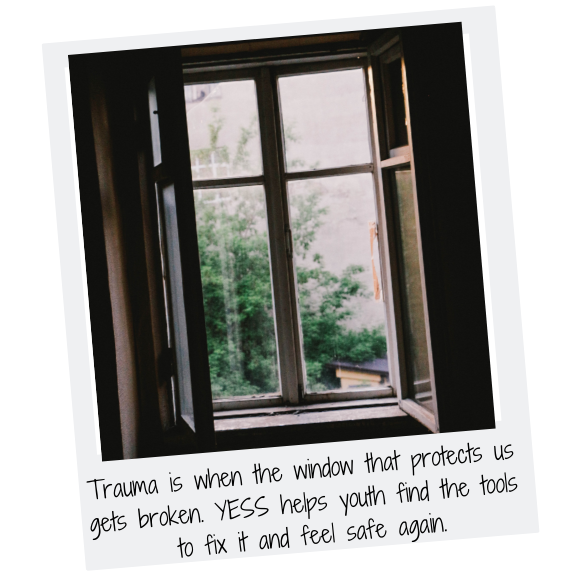by Jessica Day, Director of Program Innovations at YESS
Working in the field of trauma support is hard; my friends and family are often confused about what I do and what trauma is. I am sure you are asking the same question: what exactly is trauma and how can YESS actually help youth heal? To answer this question, I ask you to close your eyes and imagine standing in your living room, gazing out your living room window into your community. Imagine the safety and security you feel around being in your own home, in the neighbourhood you have come to love and enjoy. Imagine that a person approaches your window—this person could be a friend, family member, a neighbour, a teacher, or a complete stranger. Now imagine that this person breaks your living room window! It could be that they are breaking into your house to steal something, or they could be trying to scare you, or they could just be breaking the window for their own fun. Either way, your window is now broken, your floor is covered in glass and you are no longer protected from the elements outside (noise, insects, animals, weather, etc). We both know that the window breaking wasn’t your fault. It scared you and left a mess on the floor and has left you exposed and vulnerable, and none of this was your fault.
You have a choice now: you can avoid cleaning up the glass and replacing the window because this wasn’t your fault or you can use the tools in your house to sweep up the glass and find a way to replace the window. If the glass is not cleaned up, you will get hurt walking around and existing in your house. If your family and friends come over, they could get hurt by the glass as well. Your house will start to deteriorate because of the weather coming in and you will not feel safe or protected. If you clean up the glass, you may need to borrow a broom or get help vacuuming up the pieces. You may need to bring in an expert to help you replace the window. And you can never guarantee that someone won’t break the window again. But at least you’ll know who to call, what tools you need, and which experts can be brought in to replace the window again. It wasn’t your fault the window broke, but it is your responsibility to clean up and repair your safety, security, and home.
This is the trauma our youth face daily. It is not their fault, but they are left with the responsibility to heal, integrate into the community, and successfully sustain their independence. When the youth experience their trauma, their brains and emotions are not developed enough to know what tools, what experts, and what next steps to heal look like. They are frozen in an emotional survival mode that they use to protect themselves from the confusion, the hurt, and their lack of safety.
Here at YESS, and within every youth-serving agency, we work to help the youth feel that safety to begin to understand their trauma. As they do, we can help them access healthy tools and experts to begin to rebuild relationships and a sense of safety. When youth are given the time and support to transition through their trauma, they are able to see success and growth within themselves and understand their responsibilities and possibilities. With these successes, youth are able to heal and the cycle of support will continue within themselves, their new neighbourhoods, and eventually within our city as a whole.
As a community member, I ask that you take the time to really process what trauma means and how it affects youth, families, and communities. We cannot do this work alone—it takes a village to raise a child and it takes a community to heal from trauma. You can help. Your time, your donations, and your voice can all be tools our youth can use to help clean up their home and rebuild a better future.


Post a comment